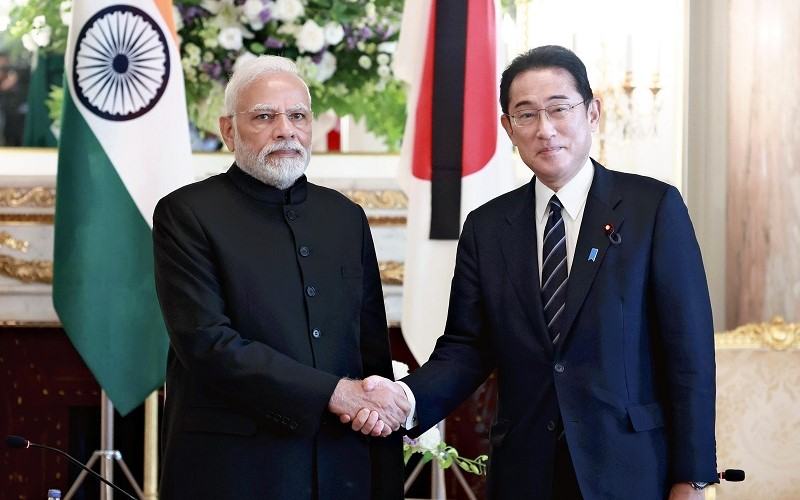
Prime Minister Fumio Kishida, right, shakes hands with Indian Prime Minister Narendra Modi before their talks at the State Guesthouse in Tokyo’s Motoakasaka district on Tuesday.
16:00 JST, September 28, 2022

Following Monday’s meeting with U.S. Vice President Kamala Harris, Prime Minister Fumio Kishida energetically continued his “funeral diplomacy” push on Tuesday by meeting Indian Prime Minister Narendra Modi and Australian Prime Minister Anthony Albanese, impressing upon those in Japan and abroad the strong unity of the Quad, a framework for cooperation among Japan, the United States, Australia and India proposed by the late former Prime Minister Shinzo Abe.
During a Japan-India summit meeting held at the State Guesthouse in Tokyo’s Motoakasaka district, Kishida told Modi that the Indian leader and Abe had “opened a new horizon for India-Japan relations.”
“We hope to build on our diplomatic achievements and work closely together toward the realization of a free and open Indo-Pacific,” he said.
Modi responded by saying that Abe was the first person to advocate for cooperation in the Indo-Pacific, leading to the creation of the Quad.
At one point, Modi nearly cried with emotion as he recounted his memories of Abe, according to those present.
During the Australia-Japan summit, Albanese praised Abe’s achievements, saying the Quad could not have started without his leadership. In addition to Albanese, Kishida held talks with three former Australian prime ministers who came to Japan to attend Abe’s state funeral.
Abe strengthened ties with India as a way to counter the rise of China, and that led to closer links among Japan, the United States, Australia and India, which share common values such as democracy and the rule of law. The Quad’s May summit held in Tokyo helped it grow into a central framework promoting a free and open Indo-Pacific.
On Tuesday, Kishida met European Council President Charles Michel, and confirmed that Japan and the EU would continue to impose sanctions against Russia in unison.
“There are some leaders we can only meet on an occasion such as this,” said a senior foreign ministry official.
Top Articles in Politics
-

Japan PM Takaichi’s Cabinet Resigns en Masse
-

Sanae Takaichi Elected Prime Minister of Japan; Keeps All Cabinet Appointees from Previous Term
-

Japan’s Govt to Submit Road Map for Growth Strategy in March, PM Takaichi to Announce in Upcoming Policy Speech
-

LDP Wins Historic Landslide Victory
-

LDP Wins Landslide Victory, Secures Single-party Majority; Ruling Coalition with JIP Poised to Secure Over 300 seats (UPDATE 1)
JN ACCESS RANKING
-

Japan PM Takaichi’s Cabinet Resigns en Masse
-

Japan Institute to Use Domestic Commercial Optical Lattice Clock to Set Japan Standard Time
-

Israeli Ambassador to Japan Speaks about Japan’s Role in the Reconstruction of Gaza
-

Man Infected with Measles Reportedly Dined at Restaurant in Tokyo Station
-

Videos Plagiarized, Reposted with False Subtitles Claiming ‘Ryukyu Belongs to China’; Anti-China False Information Also Posted in Japan






















